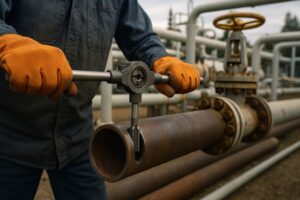Technology
The Role of Pipe Taps in Preventing Costly Leaks in Oil & Gas Pipelines
In the oil and gas industry, even the slightest equipment malfunction can result in significant financial losses and environmental damage. Leakage in pipelines can run undetected and result in escalated operational expenses, not to mention, in worst-case scenarios, devastating blowouts due to a single loose piece or a faulty thread in a pipeline joint.

Pipe taps are the unsung heroes maintaining pipeline integrity. They are used in the core to ensure a secure connection that cannot be compromised by pressure, time, or other environmental stress factors.
Precision Threading for Leak Prevention
The quality of the threads is the cornerstone of a leak-proof pipeline. Threads must be tight to establish a secure connection between valves, joints, or fittings. This is where pipe taps are necessary.
They are specially designed sets of tools that create internal threads in walls or pipe fittings to precise sizes that conform to industry standards.
On high-pressure systems, even a millimeter of misalignment between the threads creates a space that breaks the seal. The use of pipe taps reduces this risk due to their uniform thread depth and pitch, which are consistent throughout the entire connection.
Durability in Harsh Environments
The oil and gas industry has pipelines that operate under some of the most extreme conditions, including extremely high and low temperatures, pressure, and corrosive elements. All tools used in the construction and maintenance of these systems should be resistant to these extremes.
Pipe taps are typically made of robust and wear-resistant materials, such as high-speed steel (HSS) or carbide, which retain their integrity even when used repeatedly with hard materials like stainless steel or carbon alloy pipes.
Supporting Real-Time Repairs and Modifications
The other significant advantage of using pipe taps in the oil and gas industry is that they enable real-time adjustments and repairs to the system. Tapping does not necessitate shutting down the system completely, unlike other tasks such as welding.
In hot tapping, where segments of pressurized pipelines are altered without interrupting the flowing fluid, the quality of the thread made is crucial. The tapped connection must sustain the entire system at the moment of installation.
In such cases, use professional-grade pipe taps to ensure a secure seal, thereby eliminating the possibility of failure once the system is put into operation.
Enhancing Safety Protocols
The oil and gas industry places the highest consideration on safety because it regularly deals with flammable and toxic materials. Leakage of any proportion could escalate into a significant safety incident.
One of the most effective methods for maintaining safety levels is to ensure tight joints through precision tapping. Threads are connected correctly with pipe taps, eliminating the typical weak points where leaks are most likely to occur.
Cost Savings Through Long-Term Reliability
Leaks are not only dangerous but also costly. Lost products, cleanup costs, regulatory costs, and legal action can amount to millions of dollars. More to the point, micro-leaks might cause a loss of products with time and poor system efficiency.
By creating extremely accurate, pressure-tight threads using pipe taps, you can extend the service life of all connections within the pipeline system. In the long run, proper and effective tapping techniques can save you a lot.
Simplifying Compliance and Inspection
The oil and gas market is among the most highly regulated in the world. Regular inspections are conducted, and the Leak Detection and Repair (LDAR) standards must be complied with.
During the inspection, they may identify poorly threaded connections that will require rework at a high cost or result in shutdown. The quality of connection in tapped threads is perfected, ensuring that they meet the expected standards of compliance.
Conclusion
When working in the oil and gas industry, every part, every connection, and every decision matters. Although the most attention is usually paid to advanced machinery and monitoring systems, basic tools, such as pipe taps, are the ones that make the work a success and, more importantly, a safe one.
Pipe taps are indispensable for maintaining pipeline integrity by enhancing threading precision, providing increased durability, enabling live adjustments, and stopping leaks at their source. As pipeline systems continue to expand and evolve, the role of pipetaps will remain foundational to safe, efficient, and leak-free oil and gas transportation.














